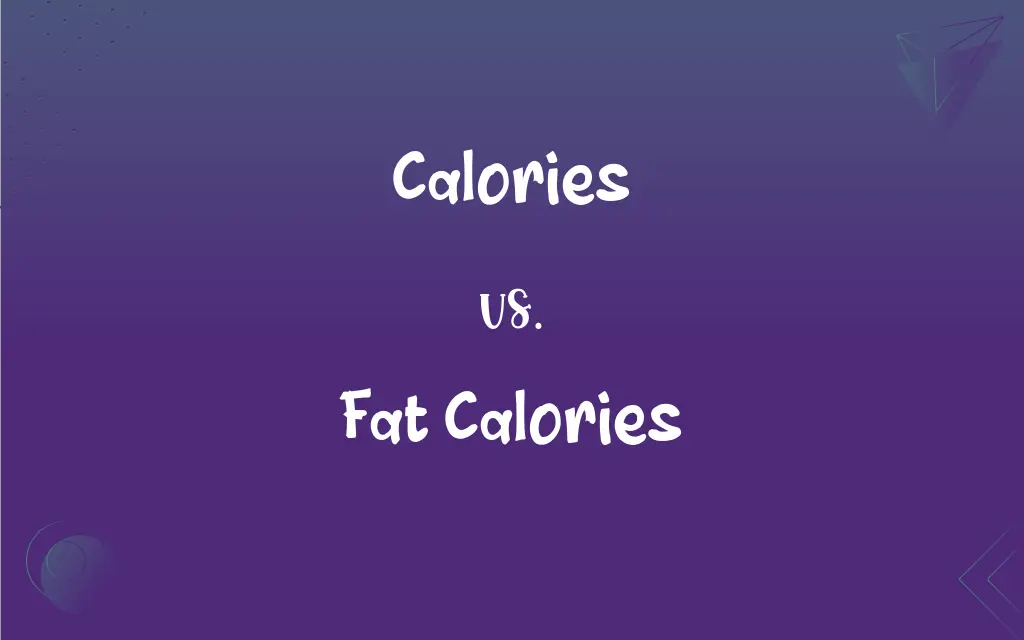Calories vs. Fat Calories: What's the Difference?
Edited by Harlon Moss || By Janet White || Published on December 27, 2023
Calories are a measure of energy from all food sources, while fat calories specifically represent energy from fats.

Key Differences
Calories are a unit of energy measurement in food, encompassing carbohydrates, proteins, and fats. Fat calories, a subset, specifically quantify the energy provided by fat content in food.
One gram of fat provides 9 calories, which are termed as fat calories, emphasizing their source. Calories, in general, may come from 4 calories per gram of proteins or carbohydrates, or 9 from fats.
The total calorie count in food includes fat calories, but not all calories are from fats. Understanding the proportion of fat calories can be crucial in dietary planning, especially for weight management.
Dietary guidelines often focus on reducing fat calories to manage weight, as they are more calorie-dense. Overall calorie intake, regardless of source, is fundamental to energy balance and health.
Labeling on food often distinguishes total calories and fat calories, helping consumers make informed choices. Balancing calories from various sources, including fats, is key to a healthy diet.
ADVERTISEMENT
Comparison Chart
Definition
Total energy from all nutrients in food.
Energy specifically from fat content in food.
Caloric Value
4 calories/gram from carbs and proteins, 9 from fats.
9 calories per gram of fat.
Dietary Impact
Total calorie count affects weight and energy levels.
High in energy density, impacts weight and heart health.
Measurement
Total calorie count on food labels.
Specified as a part of the total calories on labels.
Nutritional Focus
Balance between carbs, proteins, and fats.
Focus on fat intake, relevant for low-fat diets.
ADVERTISEMENT
Calories and Fat Calories Definitions
Calories
A key factor in determining the energy balance in diets.
To lose weight, she reduced her daily calorie intake.
Fat Calories
Fat calories are critical in nutritional labeling for informed choices.
She checks the fat calories on food labels for her diet.
Calories
Unit used to quantify energy expenditure in physical activities.
Jogging for 30 minutes burns around 300 calories.
Fat Calories
Calories derived specifically from fats in food.
This cheese has a high fat calorie content.
Calories
A unit of energy in nutrition, essential for bodily functions.
This meal plan provides the necessary daily calories for health.
Fat Calories
Used to determine the proportion of energy from fats in a diet.
Fat calories make up a large part of this ketogenic diet.
Calories
A measure of energy provided by food and beverages.
The salad contains 200 calories.
Fat Calories
A measure of energy from fats, more calorie-dense than carbs or proteins.
Avocado is healthy but high in fat calories.
Calories
Calories are vital in assessing the energy content of diets.
The chef considers the calorie content while designing menus.
Fat Calories
Important in dietary plans focusing on fat intake.
Low-fat diets aim to reduce fat calories.
Calories
Abbr. cal Any of several approximately equal units of heat, each measured as the quantity of heat required to raise the temperature of 1 gram of water by 1°C at 1 atmosphere pressure. Also called gram calorie, small calorie.
Calories
Abbr. cal The unit of heat equal to 1/100 the quantity of heat required to raise the temperature of 1 gram of water from 0 to 100°C at 1 atmosphere pressure. Also called mean calorie.
Calories
Abbr. Cal The unit of heat equal to the amount of heat required to raise the temperature of 1 kilogram of water by 1°C at 1 atmosphere pressure. Also called kilocalorie, kilogram calorie, large calorie.
Calories
A unit of energy-producing potential equal to this amount of heat that is contained in food and released upon oxidation by the body. Also called nutritionist's calorie.
Calories
Plural of calorie
Calories
Plural of calory
FAQs
Are all calories in food from fats?
No, calories can also come from carbohydrates and proteins.
How many calories are in a gram of fat?
There are 9 calories in a gram of fat.
What are calories?
A unit of energy measurement in food.
Can you consume too many calories from proteins and carbs?
Yes, excessive calories from any source can lead to weight gain.
Why are fat calories important in dieting?
They're more energy-dense and can significantly impact weight and health.
How many calories should an average adult consume?
It varies, but generally around 2000-2500 calories per day.
How are fat calories different from general calories?
Fat calories specifically come from fats, whereas general calories can come from fats, carbs, or proteins.
Is it possible to burn off fat calories?
Yes, through physical activities and exercise.
Are all fat calories bad?
No, fats are essential, but the type and quantity matter.
Do calories differ in quality?
Yes, calories from whole foods are generally better than from processed foods.
Is it necessary to count calories for a healthy diet?
Awareness helps, but balance and nutrition quality are key.
Do fat calories affect heart health?
Yes, high fat calorie intake can impact heart health.
Do children need more calories?
Yes, depending on their growth and activity levels.
How do you calculate fat calories in food?
Multiply the grams of fat by 9 to get the fat calories.
How are calories related to energy?
Calories are a measure of the energy food provides.
Are fat calories more filling?
They can be more satiating than calories from carbs.
Can fat calories help in weight loss?
In moderation, they can be part of a balanced weight loss diet.
Should athletes consume more calories?
Yes, they often need more for energy and recovery.
Can calorie needs vary by individual?
Absolutely, based on factors like age, sex, and activity level.
Do fat calories contribute to cholesterol?
Yes, especially saturated and trans fats.
About Author
Written by
Janet WhiteJanet White has been an esteemed writer and blogger for Difference Wiki. Holding a Master's degree in Science and Medical Journalism from the prestigious Boston University, she has consistently demonstrated her expertise and passion for her field. When she's not immersed in her work, Janet relishes her time exercising, delving into a good book, and cherishing moments with friends and family.
Edited by
Harlon MossHarlon is a seasoned quality moderator and accomplished content writer for Difference Wiki. An alumnus of the prestigious University of California, he earned his degree in Computer Science. Leveraging his academic background, Harlon brings a meticulous and informed perspective to his work, ensuring content accuracy and excellence.






































































